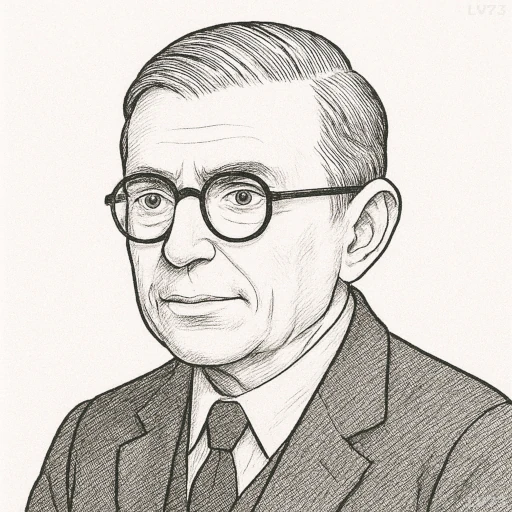“Man is fully responsible for his nature and his choices.”

- June 21, 1905 – April 15, 1980
- Born in France
- Philosopher, novelist, playwright
table of contents
Quote
“Man is fully responsible for his nature and his choices.”
Explanation
In this statement, Sartre encapsulates the core of his existential philosophy, emphasizing that human beings are not defined by an inherent essence or predetermined nature. According to Sartre, existence precedes essence, meaning that a person is not born with a defined purpose or fixed characteristics. Instead, individuals are responsible for creating their own nature and determining their identity through the choices they make. This absolute responsibility underscores the existential belief that freedom is both a gift and a burden—while humans have the freedom to shape their lives, they must also take full responsibility for their actions and the consequences of those actions.
By stating that man is “fully responsible,” Sartre rejects the notion of external determinism, such as fate, divine will, or societal influence, dictating who a person becomes. Rather, each individual is the author of their existence—there is no one to blame but oneself for the choices made. This idea ties into Sartre’s concept of bad faith, where individuals deceive themselves into believing they have no power or choice in shaping their lives, thereby evading responsibility. Sartre argues that to live authentically, one must acknowledge that all choices are personal, and even in the face of external pressures, individuals are free to define themselves.
In modern contexts, this quote can be applied to discussions around personal accountability and empowerment. In a world where individuals often face societal expectations, peer pressures, and economic or political constraints, Sartre’s perspective calls for a shift toward recognizing one’s freedom to make choices, regardless of external circumstances. This approach emphasizes self-determination—the idea that everyone has the potential to shape their own destiny and that authenticity comes from accepting full responsibility for one’s path, without resorting to excuses or shifting blame.
Would you like to share your impressions or related stories about this quote in the comments section?
